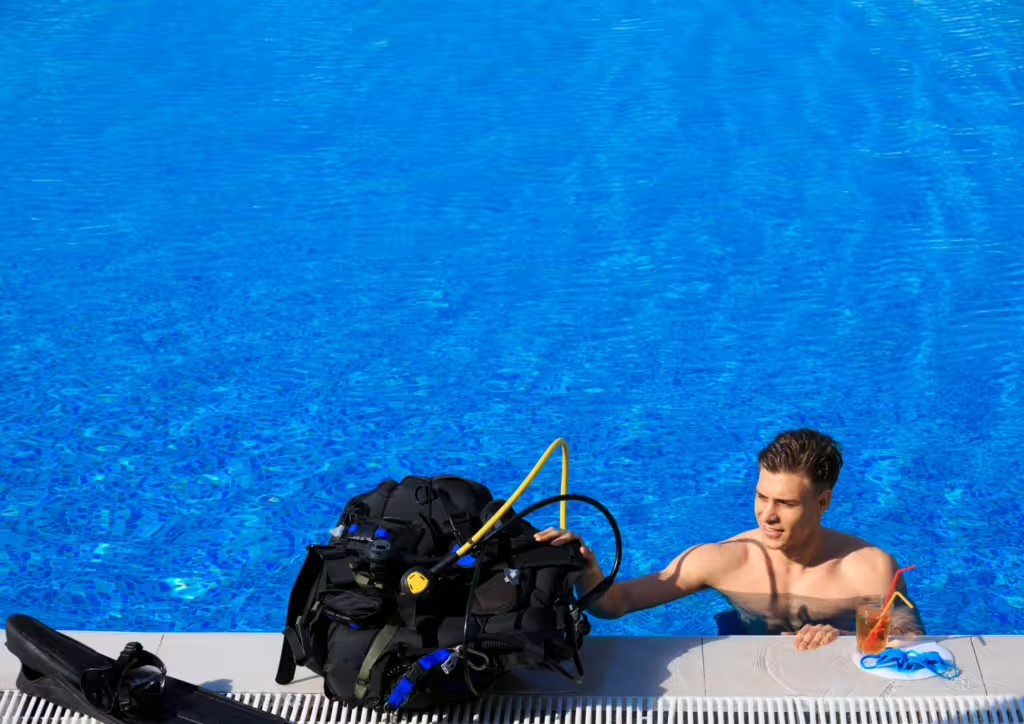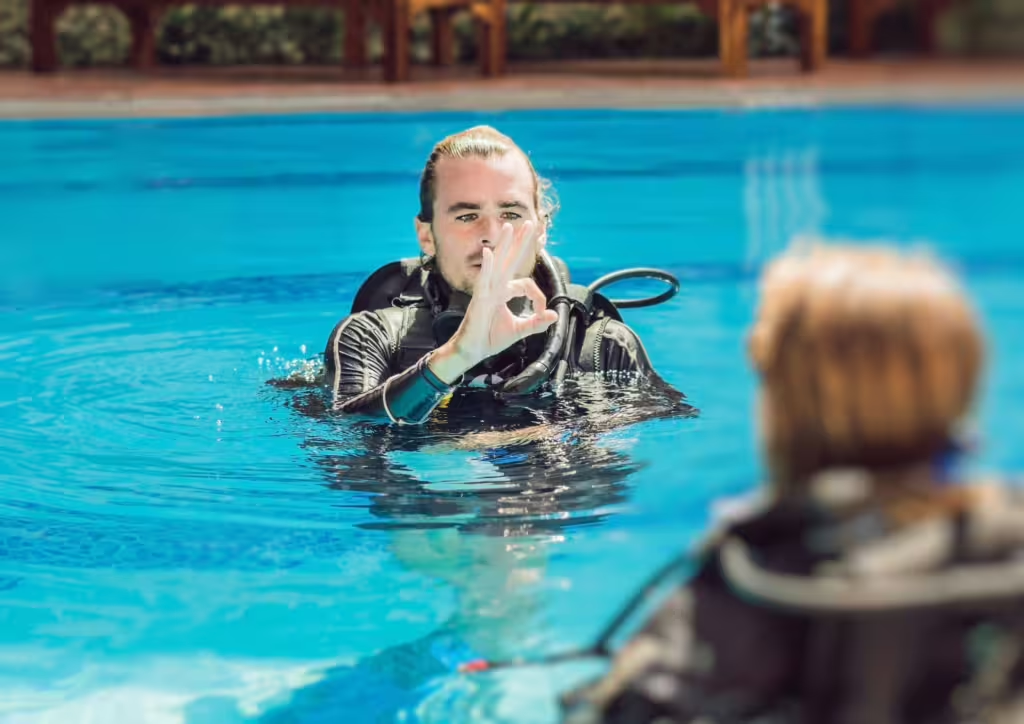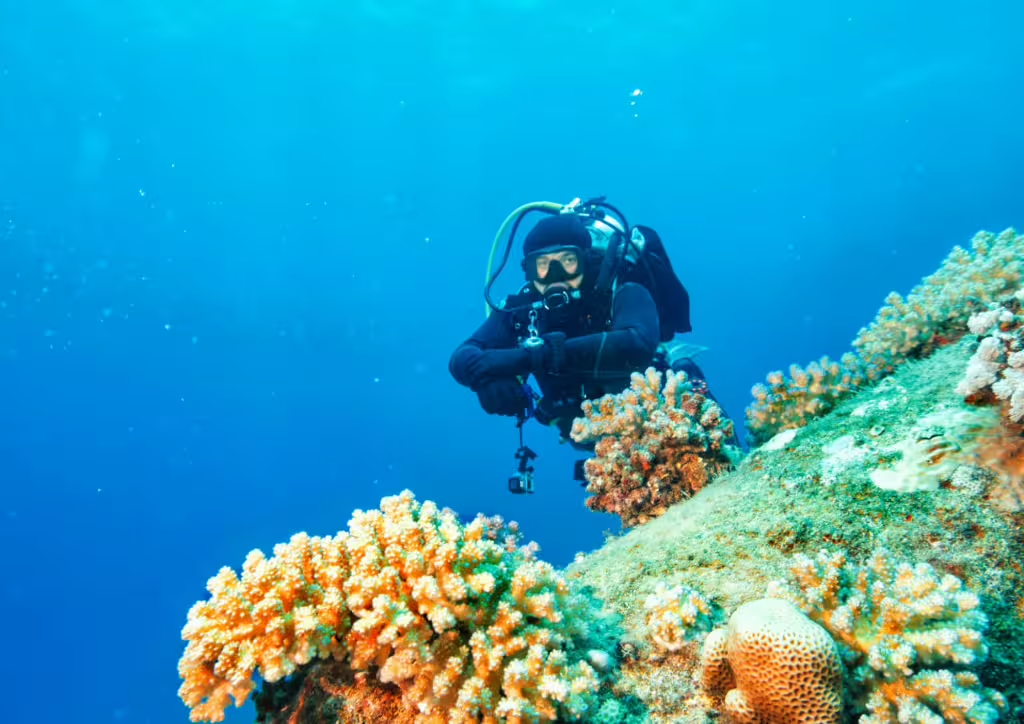If you’re considering a diving course in Bali, understanding the costs involved can help you make an informed decision about your underwater adventure. This comprehensive guide will walk you through the various expenses associated with enrolling in a diving course in Bali, ensuring that you are well-prepared for your journey beneath the waves.
Overview of Diving Courses in Bali
Diving Course in Bali is a top choice for ocean lovers, thanks to the island’s breathtaking underwater landscapes and diverse marine life. Whether you’re a total beginner or an experienced diver, there’s a Diving Course in Bali that fits your level — from fun intro programs like Discover Scuba Diving to full certifications like the PADI Open Water Diver course.
The cost of a Diving Course in Bali typically ranges between $250 and $500, depending on the course type, school, and what’s included — such as gear rental, training materials, or transport to dive sites. Some dive centers even offer all-in-one packages that bundle accommodation, meals, and extra dives for added convenience.
When choosing a Diving Course in Bali, it’s essential to research well and pick a reputable dive school with experienced instructors and well-maintained equipment. This ensures not only safety but also the best learning experience.
If you’re planning your trip, don’t forget to factor in extra expenses beyond the course itself. With the right planning, a Diving Course in Bali can be an incredible and budget-friendly adventure you’ll never forget.
Types of Diving Courses: From Beginners to Advanced

Bali offers a diverse range of diving courses tailored to various skill levels, from absolute beginners to advanced divers seeking certification. For novices, Discover Scuba Diving courses provide an excellent introduction, typically ranging from $100 to $150. These courses are short and designed to give you a taste of underwater exploration without the commitment of full certification.
If you’re looking to obtain a certification, the Open Water Diver course is the most popular choice and usually costs between $350 to $500, depending on the duration and included amenities like equipment rental and guided dives. This course includes theoretical lessons, confined water training, and open-water dives, ensuring a comprehensive learning experience.
For those who already have their Open Water certification, Bali offers Advanced Open Water courses that range from $300 to $400. These programs help divers refine their skills and explore specialized areas such as deep diving and underwater navigation. Additionally, specialty courses such as wreck diving or underwater photography can cost between $200 and $300. Overall, the variety of diving courses available in Bali makes it accessible for individuals at any skill level, allowing everyone to enjoy the mesmerizing underwater beauty the region has to offer.
Instructor Fees: What to Expect
When planning your diving course in Bali, it’s important to understand the instructor fees, which can vary significantly based on several factors such as the instructor’s experience, the course level, and the diving school’s reputation. Typically, the cost of hiring a certified instructor ranges from $50 to $150 per day. Highly-rated diving instructors with extensive experience and advanced certifications may charge on the higher end of this spectrum.
Additionally, specialized courses, such as advanced diving techniques or underwater photography, could entail even greater costs due to the additional expertise required. It’s also essential to consider what is included in the instructor fees. Some diving schools offer package deals that encompass equipment rental, certification costs, and other necessary materials.
Others may provide these services separately, which could lead to unexpected expenses. Thus, when budgeting for your diving course in Bali, ensure you inquire directly with the diving school to understand the total cost associated with hiring an instructor, as this will help you plan your finances accurately and avoid any surprises during your diving adventure.
Course Materials and Gear Rental Costs

When enrolling in a diving course in Bali, one important aspect to consider is the cost of course materials and gear rental. Most diving schools provide essential materials such as textbooks, dive tables, and training manuals as part of the course fee, but it’s wise to verify what is included. Additionally, renting gear is usually a common practice for new divers who may not own equipment yet. In Bali, rental costs can vary significantly depending on the school and the quality of gear, with prices typically ranging from $30 to $70 for a complete set of equipment, which includes a wetsuit, regulator, buoyancy control device (BCD), and tank.
Always ask if rental gear is included in the course package to understand the total expenses involved. Besides the basic equipment, there may be additional costs for specialized gear or optional items such as dive computers or underwater cameras. If you’re keen on photography or exploring deeper dive sites, these accessories can enhance your experience, albeit at an extra expense. Evaluating these costs upfront will allow you to budget more effectively and avoid any surprises once you’re ready to dive into the wonderful underwater world of Bali. Overall, knowing these details will help you make an informed decision about your diving course in Bali and ensure a seamless learning experience.
Insurance Considerations for Divers
When planning to enroll in a diving course in Bali, one crucial aspect that often gets overlooked is the need for proper insurance. Diving is a thrilling activity, but it comes with inherent risks that can lead to accidents or injuries. As a diver, it’s essential to have insurance that specifically covers scuba diving activities. This typically includes coverage for emergency evacuation, treatment of diving-related conditions such as decompression sickness, and any potential equipment damage.
It’s advisable to review different policies and select one that suits your specific diving needs and destination, as some general travel insurance policies may not cover diving incidents. Moreover, when selecting a diving course in Bali, many dive shops will require proof of insurance before you can participate. This is both a legal requirement and a measure to ensure your safety while underwater.
Be sure to ask your chosen diving school if they have any recommended insurance providers or specific requirements for your coverage. Investing in comprehensive diving insurance can give you peace of mind, allowing you to fully enjoy your diving experience in the beautiful waters of Bali.
Hidden Costs: Taxes and Additional Charges
When considering a diving course in Bali, it’s crucial to be aware of the hidden costs that may not be immediately obvious in the advertised prices. Many diving schools add local taxes and fees that can increase the overall expenditure. These extra charges can vary depending on the provider and the type of course you choose.
You might encounter administrative fees, equipment rental costs, or even insurance surcharges that are not included in the initial price quotation. Understanding these additional financial aspects will help you create a more accurate budget for your diving adventure. Furthermore, some diving courses may require you to pay for optional extras such as photography packages, personalized equipment, or guided tours of the underwater sites.
Make sure to inquire about all potential extras before committing to a package, as these can significantly impact the total price of the course. It’s advisable to read the fine print and speak directly with instructors to clarify all costs involved. This way, you’ll not only enjoy your diving experience in Bali but also manage your finances wisely throughout your journey.
Comparing Prices: Local vs. International Diving Schools

When considering a Diving Course in Bali, one of the most important aspects to evaluate is the price differences between local and international diving schools. Local diving schools often offer competitively priced courses, usually reflecting the lower operational costs in the region. These schools may provide a more personal touch, as they are often smaller and have a closer connection to the local diving community.
Packages can range from basic introductory courses to full certification programs, frequently at a fraction of the price one might pay at international chains. As an added bonus, local instructors bring their unique insights and familiarity with the best dive spots around Bali, enhancing the learning experience. On the other hand, international diving schools in Bali often come with a premium reputation and structured programs that may be recognized worldwide.
They typically offer a broader array of advanced courses and specialized training, which can be appealing for serious divers aiming to further their skills. However, this comprehensive approach often comes at a higher price point. Students may find that while the upfront cost is steeper, the investment could yield benefits such as better training resources, more extensive safety measures, and internationally recognized certification upon completion. Ultimately, your choice may depend on your budget, desired diving experience, and personal goals within the underwater world.
Tips for Budgeting Your Diving Experience in Bali
When planning your diving adventure in Bali, budgeting is crucial to ensuring a fulfilling experience without breaking the bank. One of the first tips for budgeting a diving course in Bali is to compare prices across different diving schools. Costs can vary widely based on the school’s reputation, the duration of the course, and the inclusivity of packages.
Look for schools that offer group discounts or special packages that include equipment rental, transportation, and even accommodations. Additionally, consider the timing of your trip; off-peak seasons may yield lower prices and more availability in courses, allowing for a more comfortable learning experience. Another key aspect of budgeting is to account for additional expenses that may arise during your trip.
While a diving course in Bali often includes essential training, you may want to set aside funds for extra activities like underwater photography, excursions to nearby dive sites, and meal expenses. Also, remember to factor in the costs of safety gear or insurance if they are not included in your diving course package. By taking the time to research and plan your budget carefully, you can maximize your Bali diving experience while keeping your finances in check.
Wrapping Up Your Diving Course Journey in Bali
In conclusion, understanding the cost breakdown of a diving course in Bali is essential for making an informed decision. From equipment rentals to instructor fees, every aspect contributes to the overall investment in your underwater adventure. By being aware of these elements, you can budget effectively and select a course that suits your needs and expectations, ensuring that your diving experience is both enjoyable and memorable.
Additionally, consider how these costs align with the value of the unforgettable experiences and breathtaking marine life you will encounter while diving in Bali. By choosing the right course, you not only invest in your skills and safety but also create lasting memories in one of the world’s most beautiful diving locations. So, dive in with confidence and excitement knowing you’ve got a clearer picture of what to expect financially!

